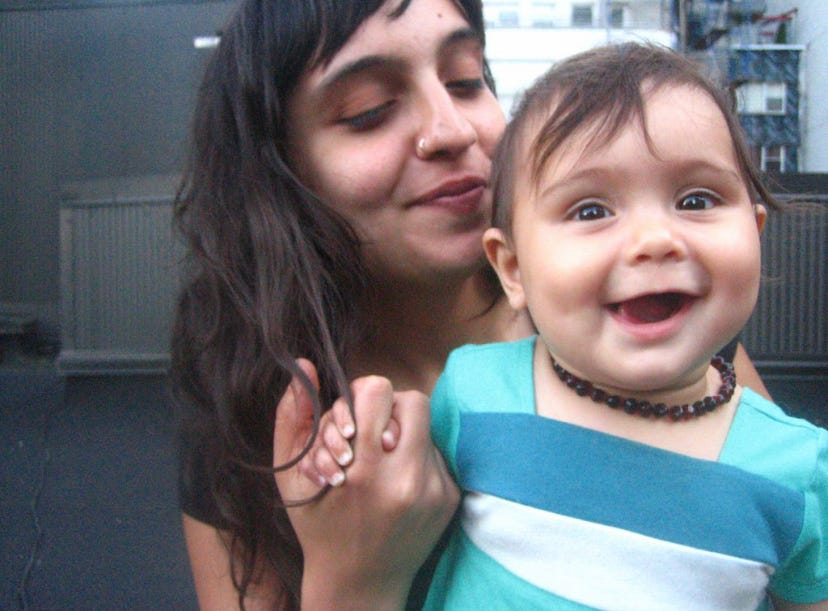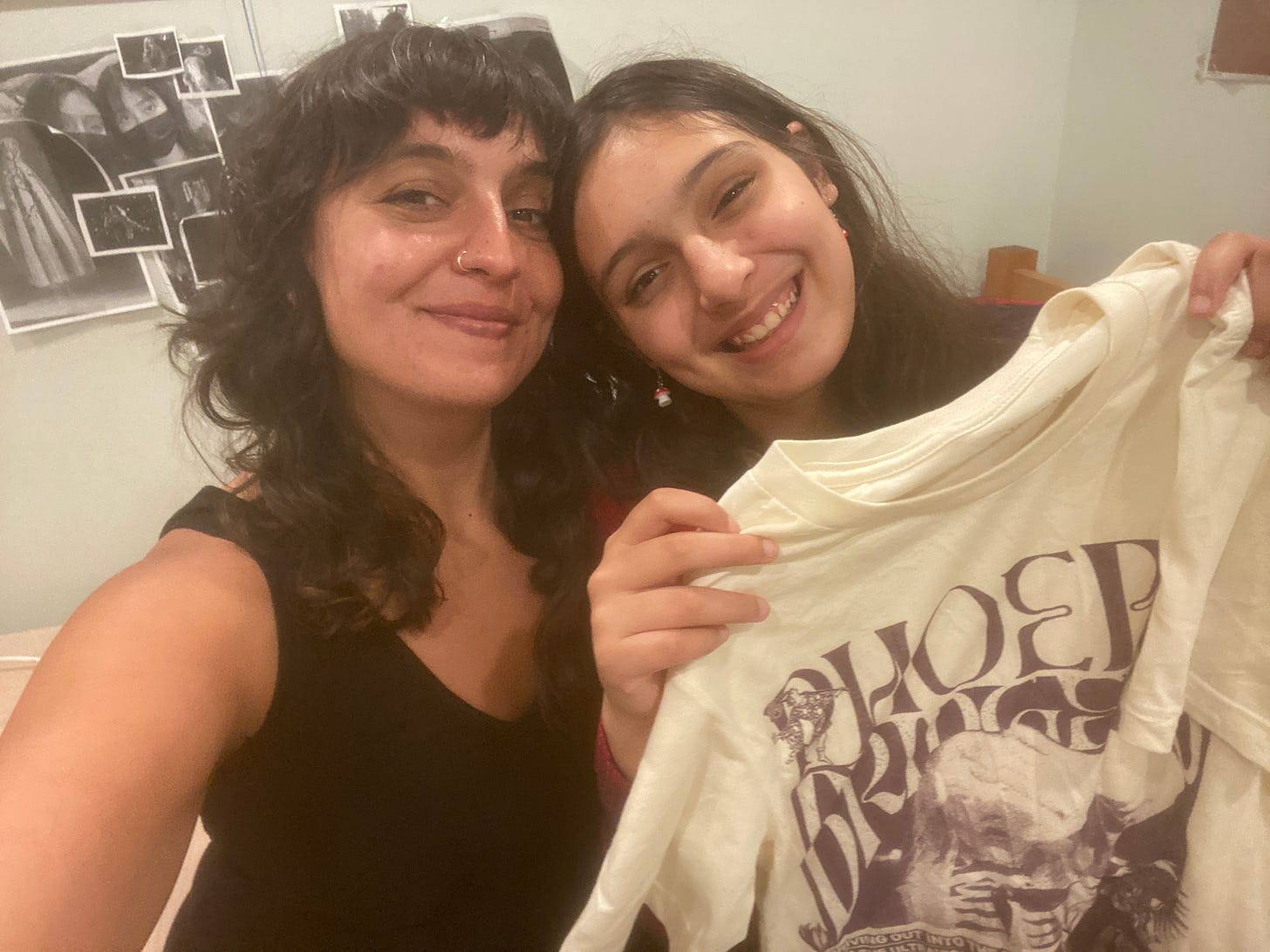Graceland Too
In which she cries at a Phoebe Bridgers concert
There's this Phoebe Bridgers' song called "Graceland Too" and the first time I heard it I, who at that time was not a particularly big Phoebe Bridgers fan, turned to my teenaged daughter, who was, and complained "this sounds exactly like Sufjan Steven's "For the Widows in Paradise, for the Fatherless in Ypsilanti."
"Who's Sufjan Stevens again?" she asked.
"He's the 'all things grow' guy," my son piped up from the backseat of the car.
"Right," she said.
We were "playing DJ," as we call it - taking turns choosing a song, in age order - and since it was my turn next, I requested "For the Widows in Paradise" to illustrate my point. As it reached its crescendo, I turned to her again. "Wren, there is NO WAY Phoebe Bridgers doesn't know this song," I said. "The banjo? The harmonies? The literal repeating of 'I would do anything for you?'"
She shrugged, noncommittal. "I guess."
I let it go. It's kind of a mom thing to do, argue that a song in 2003 inspired a song in 2020, that the music one's child is listening to is actually derivative of the music one listened to in one own's overly ardent, earnest youth, anyway.
"Graceland Too" as far as I can tell, refers at least in part to an MDMA trip, and a kind of desperate, young love for someone who is fighting whatever young demons they are. I'm not sure Wren knows in any real way what it means, yet, to "spen[d] what is left of our serotonin / and chew on our cheeks / and stare at the moon," but I'm sure, with her whole life spread out ahead of her like an open road, she has her own wistful ideas about what it means to love someone so desperately you would do anything for that person.
Because I am her mother, she probably has never imagined me having ever had those kinds of wistful feelings of young love, and though I'm even more sure she has never imagined me high, I very much know what that line about serotonin and chewing one's cheeks means, know what it is to be with someone in a field looking up at a night sky with dilated pupils, marveling over how their hair feels to you, in that moment, as soft as the feathers of a baby chick. I know what it is to feel, desperately, both how young you are and also how many roads of darkness you've already walked, to feel how heavy that endless expanse ahead of you can feel - and to feel, quite frankly, that you want to stop walking. But when she and I sing it together now in the car as we drive, our voices twining around each other, harmonizing – she always sings the Phoebe Bridgers; I always sing the Lucy Dacus – I don't think she imagines me recognizing those moments of my past in it. In fact, I'm sure I am the last thing on her mind when she hears those lyrics, which is as it should be.
Truth be told, when I sing those lyrics with her now, our voices looping together, repeating, I don't even think about those moments, not the way I might have thought of them in 2003, not the way that flickers with an echo of bottomless longing deep in my chest for the people who came and went. If I were a character in a movie, or a TV drama and I heard this song – me, a 43 year old mother of 4 – surely I’d be portrayed remembering “the one who got away,” or the soulmate that saved me from my demons, or the soulmate who succumbed to theirs. Our culture fetishizes this kind of love: romantic love in general, but especially of the tragic, tortured sort. I am supposed to long for the freedom and fantasy of my youth. But the truth is, if I am reminded of those nights in fields or parks or dorm rooms or loud loft parties it is only with a kind of curious, anthropological distance.
Because I am her mother, what I think of, instead, is the night I met her.
What I think of is how, flooded with the highest concentration of oxytocin any human ever experiences, I looked at her face and the most desperate joy coursed through my body, a twin feeling of something beginning and something ending. It was the feeling of my brain literally transforming: the parts related to memory decreasing, the parts related to empathy growing. In the days and weeks that would follow, each moment of nurture would build her brain and rewire mine. In the days and weeks that would follow, each moment of nurture had me unlearning a politic of domination and relearning a politic of interdependence. I was becoming someone new: someone who could heal. I was becoming someone new: someone who could love. A liberatory love, a love of revolution. A love that started with one person but was bigger than that one person; a love that, as bell hooks describes, “moved beyond the realm of feeling” and into action and choice, a “practice of freedom.”
I didn’t know that, exactly, that night; how could I? We talk about parenting through the lens of being life giving, not lifesaving. In movies, parents’ brains change only to become more scattered: the forgetfulness of “placenta brain” or sleep deprivation. The best known songs about being a parent are the ones about giving them away to the true “love of their lives” at their wedding. But I knew it because I could feel it. I looked at her that night, knowing that in that one moment everything had changed: that I had found myself in a love that had no bounds, that would never end, that would make and remake me, and that because of that I would never walk through the world or even think about the world in the same way again. Knowing there was nothing bittersweet or naive or hopelessly romantic about what I was feeling; knowing, for the first time, that I would in fact, unconditionally, do anything for someone else: make whatever sacrifice, walk through whatever fire, not because I had to, not out of any sense of gallantry or poeticism, not even because it was the right thing to do, but because I wanted to. Knowing I was giving this person I had just met my whole heart; knowing I was giving it to her so thoroughly that it may as well now exist outside of my body; and knowing that, because it no longer existed in my body, I had now made it completely vulnerable in a way I never had. Knowing that I was guaranteed absolutely nothing.
Knowing beyond all knowing that I had in fact lived through whatever I had lived through to get to this moment, that now suddenly I was tethered to this whole imperfect world, that I was, for the first time, where I belonged and where I would stay.




This is unbearably beautiful. It's the only piece of writing I've found that captures what those moments after birth felt like. Thank you for sharing <3
Wow. The way your writing is at once very personal and very universal…just wow. Thank you, once again, for putting these experiences into such poignant words.